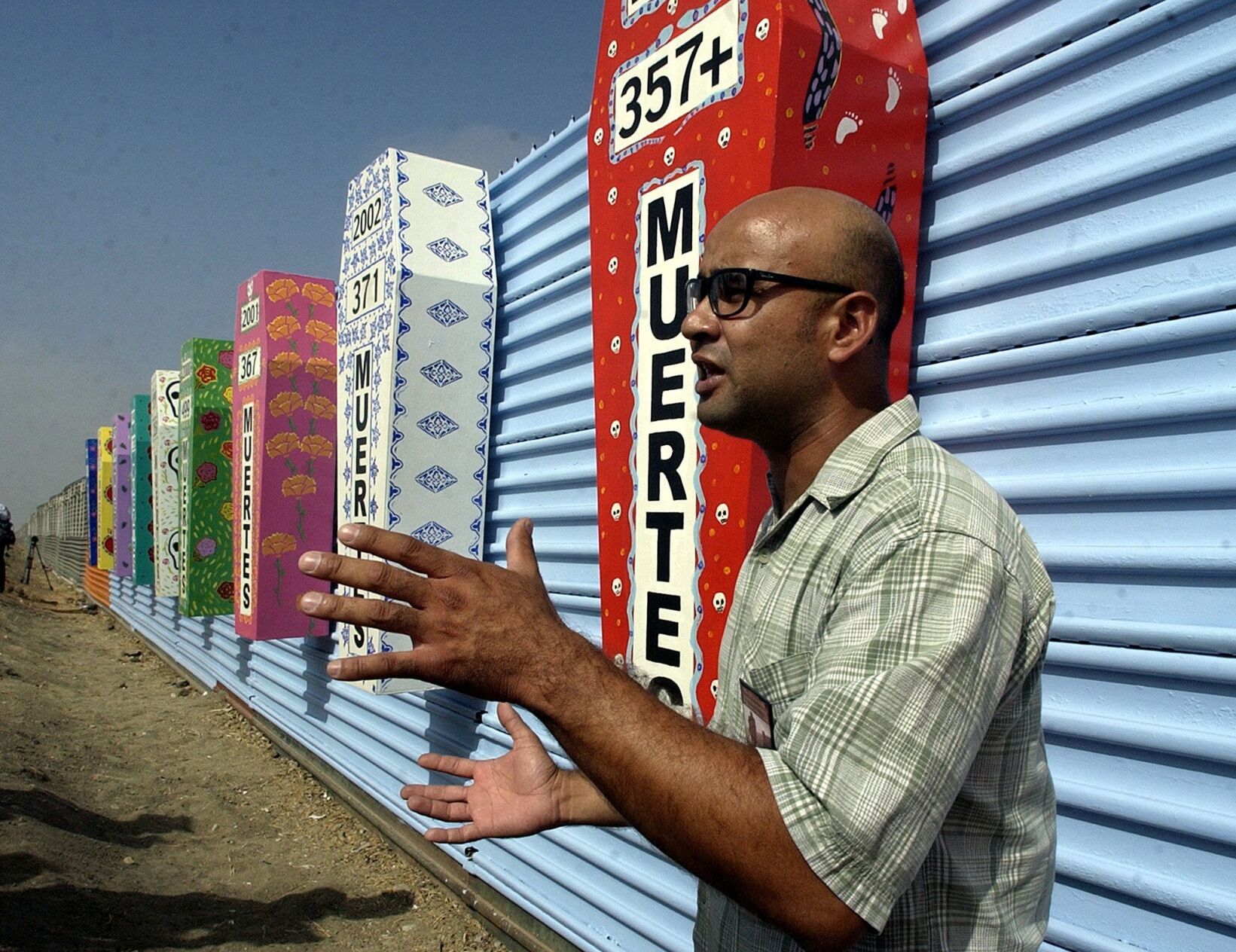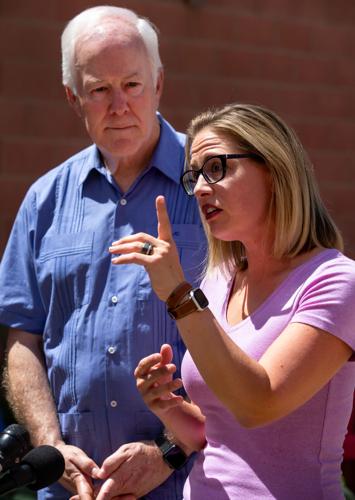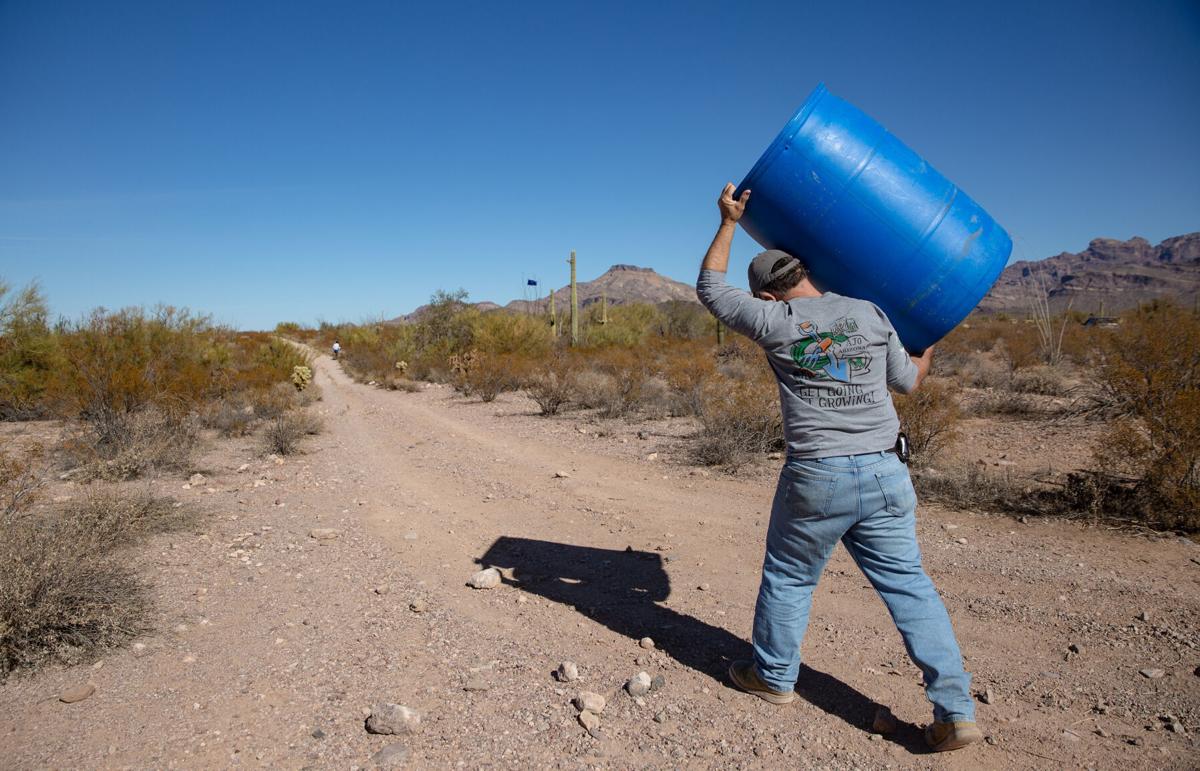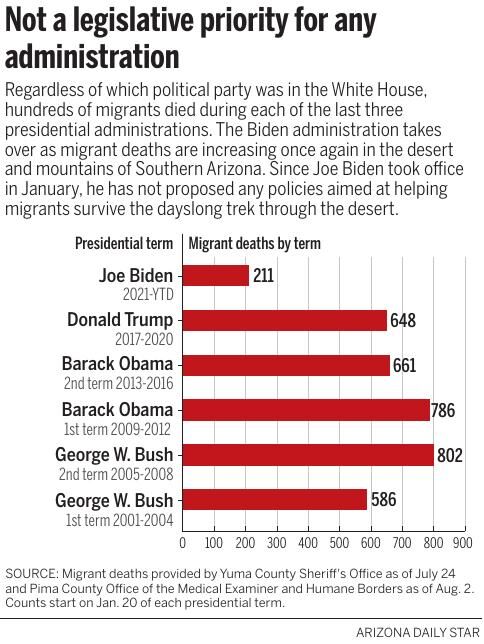Third of four stories
 |
As a political issue, the deaths of thousands of migrants in Southern Arizona rarely appear at the forefront of federal lawmakers' discussions.
The issue popped up sporadically over the past two decades in bills proposed by a handful of lawmakers from both the Republican and Democratic parties. In all but one instance, bills that addressed migrant deaths either stalled in committees or were voted down as part of comprehensive immigration reform bills, the Star found after reviewing Library of Congress archives since 2000.
Soaring rhetoric about a "higher moral obligation" to save lives in 2006 from Sen. Bill Frist, a Republican from Tennessee, faded away over the years. Migrant deaths remain part of the immigration debate, but they mainly are relegated to the periphery of that discussion unless they can be used as props for other arguments, the Star found by tracking 2021 comments from officials and lawmakers.
In March, President Biden tried inaccurately to explain away a dramatic rise in border crossings by saying migrants cross in the winter to avoid the deadly summer heat. Migrant deaths were the top reason Yuma County officials cited to justify Gov. Doug Ducey's deployment of the National Guard to the border in April, despite the Guard's mission not including rescues. Sen. Kyrsten Sinema, a Democrat from Arizona, cited the deadly danger of crossing the border in Southern Arizona as a reason to support her immigration bill during a visit to Tucson in June, even though her bill did not address migrant deaths.
Large-scale deaths of migrants began in 2000 and continued regardless of whether the president was a Democrat or Republican. The remains of 500 to 800 migrants were found in Southern Arizona during each presidential term, including 1,400 during the two terms Joe Biden served as vice president during the Obama administration.
Since Biden's first term as president began in January, the remains of more than 222 migrants were found in Southern Arizona, putting this year on pace to surpass the record-breaking 239 remains found in 2020. Biden has proposed wide-ranging reforms to immigration and border policy, but none is aimed at reducing migrant deaths.

In this 2003 photo, Tijuana artist Alberto Caro speaks at the U.S.-Mexico border fence in Tijuana, Mexico, at a ceremony marking the ninth anniversary of Operation Gatekeeper, a Border Patrol program that critics say forced illegal immigrants into crossing Arizona’s desert. A coffin marked with the number of immigrants who died trying to cross the border that year was hung next to coffins with previous years’ death totals.
'We have higher
moral obligation'
Immigration reform and border enforcement frequently appeared in federal legislation since 2000, but the vast majority of those bills did not address migrant deaths.
When lawmakers did address those deaths, the proposed measures made little progress, with certain provisions jumping from bill to bill over the years without becoming law.
In 2006, Frist introduced the Border Deaths Reduction Act, which would have directed Customs and Border Protection officials to gather data on the number of migrant deaths, causes of deaths, locations and demographic information.
If Congress had passed the bill, CBP officials would have analyzed trends in that data, evaluated CBP strategies for reducing migrant deaths, including the use of rescue beacons, and recommended actions to reduce those deaths.
The report in Frist's bill would have contained "particular emphasis on enhancing the deployment of rescue beacons in the Tucson Sector." The bill would have authorized $500,000 for the report and $1.5 million to deploy more rescue beacons.
No votes were held on the bill in the Senate.

Then-Sen. Kamala Harris, D-Calif., listens as U.S. Customs and Border Protection Commissioner Kevin McAleenan speaks during a hearing of the Senate Judiciary Committee on oversight of Customs and Border Protection’s response to the smuggling of people at the southern border on March 6, 2019, in Washington.
When Frist introduced the bill, he pointed to a Government Accountability Office report that said migrant deaths had doubled since 1995, despite border crossings not increasing. The Border Patrol "has not addressed these limitations to sufficiently support its assertions about the effectiveness of some of its efforts to reduce border-crossing deaths," GAO officials wrote.
The results of the GAO report were "sobering, shocking, and, I strongly believe, a cause for action," Frist said as he introduced the bill in 2006. "Since 1995, deaths along our borders have doubled. Despite the heroic rescue efforts of the men and women of Customs and Border Protection, things have gotten worse."
The increase in migrant deaths "stem largely from an increase in deaths from exposure to the elements in the Sonoran Desert in Arizona," Frist said at the time. "Illegal entries, however, have not increased. Quite frankly, it is getting more dangerous to cross the border."
"Until recently, CBP did not even keep a systematic count of those who died crossing our borders," Frist said. "We still do not have a unified national strategy for reducing the deaths. We still do not know how well our safety efforts work — if they are saving lives or not. We need to do more."
"The founding document of our nation, the Declaration of Independence, lists 'life' first on the list of the government's responsibilities," Frist said. "The overwhelming majority of the people who cross our border do so in search of a better life. They take enormous risks and make enormous investments in hopes of helping their families."
"Illegal immigration needs to stop," Frist said. "We must defend our borders. We must construct physical barriers, add detention beds, hire personnel and equip them with better technology."
"But we have a higher moral obligation to protect the life of every person —every man, woman, and child — who sets foot on American soil. We must do everything in our power to preserve life," Frist said.
At that point, the remains of about 1,040 migrants had been found in Southern Arizona, according to the Pima County medical examiner.
Although Frist's bill did not become law, the provisions in the bill about gathering data on migrant deaths, compiling a report, and recommending actions to reduce those deaths were included in several comprehensive immigration reform bills introduced in 2006 by three other Republican senators: Arlen Specter from Pennsylvania, Chuck Hagel from Nebraska and Rick Santorum from Pennsylvania.
Specter's bill passed the Senate, but not the House. The bills sponsored by Hagel and Santorum did not advance beyond the Senate Judiciary Committee.
The following year, the same provisions appeared in bills proposed by Sen. Edward Kennedy, a Democrat from Massachusetts, Rep. Luis Gutierrez, a Democrat from Illinois, Sen. Harry Reid, a Democrat from Nevada, and Sen. Johnny Isakson, a Republican from Georgia. None of the bills became law. Reid's comprehensive immigration bill was widely debated in the Senate but ultimately did not pass.
The provisions expanded in 2009, when Rep. Solomon Ortiz, a Democrat from Texas, sponsored a bill that included directing CBP officials to "conduct a study of Southwest Border Enforcement operations since 1994 and its relationship to death rates on the US-Mexico border."

President George W. Bush speaks about border security at Davis-Monthan Air Force Base in Tucson in 2005.
Legislation lags
as deaths mount
The study in Ortiz's bill would have included an analysis of the "relationship of border enforcement and deaths on the border," whether "physical barriers, technology and enforcement programs have contributed to the rate of migrant deaths," and the "effectiveness of geographical terrain as a natural barrier for entry into the United States in achieving department goals and its role in contributing to rates of migrant deaths."
The study also would have directed CBP officials to consult with nongovernmental organizations and community members "involved in recovering and identifying migrant deaths" and an "assessment of existing protocol related to reporting, tracking and inter-agency communications between CBP and local first responders and consular services."
The report on the study would have been submitted to the "United States-Mexico Border Enforcement Commission," made up of a mix of local and federal officials, border residents and others.
Ortiz's bill was referred to committees and no vote was held in the House.
By the end of 2009, the remains of about 1,620 migrants had been found in Southern Arizona.
The expanded provision appeared again in 2010 in a bill sponsored by Sen. Robert Menendez, a Democratic senator from New Jersey who is helping lead the charge on Biden's immigration bill in 2021. The expanded provision also appeared in 2012 in a bill from Rep. Raúl Grijalva, a Democrat who has represented districts along Arizona's border with Mexico since 2003. Neither bill passed.
In 2013, Sen. Charles Schumer, a Democrat from New York and current majority leader, sponsored a comprehensive immigration bill that included provisions calling for CBP to identify areas where migrant deaths are the most frequent, study the relationship between enforcement and deaths, clarify CBP efforts to mitigate those deaths and install up to 1,000 rescue beacons.
By that point, the remains of about 2,400 migrants had been found in Southern Arizona.
In 2014, the Border Patrol changed how it counted migrant deaths to include only instances where an agent was directly involved. As a result, the Border Patrol's count started to diverge dramatically from the count by the Pima County medical examiner. In 2020, the Border Patrol's Tucson and Yuma sectors reported 49 migrant deaths, roughly one-fifth of the 239 counted by medical examiners in Arizona.
In 2014 and again in 2015 and 2017, a bill introduced by Rep. Beto O'Rourke, a Democrat from Texas, would have directed CBP to gather data on migrant deaths, including the extent to which CBP has "adopted simple and low-cost measures, such as water supply sites and rescue beacons, to reduce the frequency of migrants' deaths."
Grijalva introduced a bill in 2015 and again in 2017 that would have directed CBP to gather data, analyze trends, recommend actions, and study the relationship between enforcement and migrant deaths. The bill also would have directed CBP to specify where rescue beacons were needed.
In 2017, Sen. John Cornyn, a Republican from Texas, introduced a bill to direct CBP to figure out the total number of migrant deaths and report to Congress on efforts to identify remains.
By the end of 2017, the remains of about 2,950 migrants had been found in Southern Arizona.
In 2019, Rep. Veronica Escobar, a Democrat from El Paso, introduced the Homeland Security Improvement Act. That bill would have directed CBP officials to evaluate policies to "reduce the number of migrant deaths," among other provisions. It also would have directed CBP to report the "extent to which border technology, physical barriers, and enforcement programs have contributed to such migrant deaths."
Escobar's bill passed the House, but not the Senate. During the debate on the House floor, Rep. Mike Rogers, a Republican from Alabama, opposed the bill on similar grounds to the current opposition to immigration reform.
"Law enforcement has encountered nearly a million migrants illegally crossing the southwest border," Rogers said in September 2019. Democrats refused to see the "crisis," he said, and after Trump administration policies took effect the "crisis has finally abated."
Instead of proposing "another partisan messaging bill that stands no chance of becoming law," Democrats should have presented a "bipartisan bill to address the causes of the border crisis and prevent another one from happening," Rogers said.
In response, Escobar said the bill was an "opportunity to come together and begin to make a powerful and well-funded federal agency more accountable to the Congress and to the people that they serve." The bill "comes right from the communities that are impacted the most," Escobar said.
Rep. John Joyce, a Republican from Pennsylvania, said his district is nearly 2,000 miles away from the border, but "illicit drugs continue to pour across the southern border and infiltrate into my district," causing "addiction and death," Joyce said.
Instead of passing Escobar's bill, he suggested they return to committee and "work on a bipartisan basis to secure our border, to end the asylum loopholes, and to protect this great country," Joyce said.

Border Patrol Agent Andy Adame waits for other agents to help process 78 border crossers found hiding under trees near Arivaca in 2007.
In 2019, Escobar called for the creation of an ombudsman and border oversight panel, with one of various goals being to reduce migrant deaths. The bill passed the House. Sen. Tom Udall, a Democrat from New Mexico, introduced similar legislation, but it did not pass the Senate.
The exception to the rule was the Missing Persons and Unidentified Remains Act introduced by Cornyn in 2019, which became law after former President Trump signed it in December 2020. The law opened up grant funding to local governments and nongovernmental organizations to deal with migrant deaths and identify remains, although Cornyn ensured priority would not be given to the border area. The bill also funded more rescue beacons.
The law also requires CBP to file a detailed report with Congress and post it on the CBP website by the summer of 2021 about its efforts to count migrant deaths and mitigate those deaths, its collaboration with local governments and nonprofits, and the effectiveness of rescue beacons.
The bill passed the House on Dec. 16 after 10 minutes of debate in a nearly empty chamber. The speaker pro tempore, Rep. Henry Cuellar, a Democrat from Texas, called for a voice vote, but the few Congress members in the chamber didn't respond. He had to ask them again, prompting a handful of "ayes."
In other words, after 20 years and at least 3,900 deaths, the thrust of the first substantial action taken by Congress was to count how many migrants had died and to identify them.
Just one sentence
In his first days in office in late January, Biden pushed for broad immigration legislation to address a variety of issues.
When Democratic lawmakers introduced the 353-page bill in February, it contained just one sentence about migrant deaths, calling for more rescue beacons in the desert.
In a call with reporters days after the bill was introduced, several lawmakers responded to the Star’s question about how the bill would address migrant deaths but quickly veered off into other topics.
The bill addresses “certain concerns that our humanity compels us to address,” said Rep. Linda Sanchez, a Democrat from California who sponsored the bill in the House.
“Obviously, the deaths at the border, the rescue beacons are an important part of that,” Sanchez said. “But so is professional training for CBP and having medical training, having humanitarian standards for those that are detained, particularly for children and vulnerable populations.”
Sanchez said the “most exciting” part of the bill is that it addresses the root causes of migration, a thought echoed by Menendez, the New Jersey Democrat who sponsored the bill in the Senate.
“Yes, the beacon is only one example of modernizing and managing the border effectively with technology that enhances our ability not only to be humane but also to detect contraband and counter transnational criminal networks,” Menendez said.
The bill was introduced just as Border Patrol encounters with migrants started to accelerate dramatically. As those encounters reached historic highs, President Biden waved away concerns by telling a reporter at a March 25 press conference that the increase in migration “happens every single, solitary year” in the winter months.
“The reason they’re coming is that it’s the time they can travel with the least likelihood of dying on the way because of the heat in the desert,” Biden said.
Four months later, Biden's words came back to haunt him politically, not because he had done nothing to address migrant deaths, but because border crossings continued to rise in the summer, which contradicted his claim that the rise in February and March was seasonal.
When Arizona Gov. Ducey deployed the National Guard to the border in late April, the Yuma County Sheriff’s Office issued a news release supporting Ducey’s decision and citing migrant deaths before any other concern related to the border.
When Department of Homeland Security officials announced a wide-ranging crackdown on smuggling organizations on April 27, they spent nine paragraphs talking about targeting the logistics of those organizations before ending with the line: “In Fiscal Year 2020, Border Patrol located 250 migrants who died during their journey.”
The exception to the legislative indifference to migrant deaths came in May when Escobar reintroduced her bill.
When Sen. Sinema came to Tucson on June 1 to promote her border bill, part of her pitch was the rising number of border encounters in Southern Arizona as the summer heat arrived.

Sen. Kyrsten Sinema of Arizona and Sen. John Cornyn of Texas speak at Casa Alitas migrant shelter in Tucson in 2021.
As Sinema spoke to reporters at Casa Alitas, a shelter for asylum-seeking families in Tucson, about the importance of the bill she sponsored with Cornyn, she noted the “deadly” journey migrants make through Southern Arizona.
“The reality is that it’s getting more and more deadly every day as our temperatures are increasing,” the Arizona Democrat said. “And the routes, particularly in the Tucson Sector, as you all know, is very treacherous terrain and the number of search-and-rescue attempts are increasing every day.”
The Star asked Sinema and Cornyn why they did not include any measures addressing migrant deaths in their bill. Both pointed to the rise in border crossings, rather than deaths in the desert, as the "immediate crisis" that needed attention.
Sinema said one goal of the bill was “jump-starting the conversation" to "target the immediate crisis that both of our states are suffering from.”
“This bill was meant to deal with the immediate crisis at hand, which has to do with asylum claims and our inability to process those claims in front of an immigration judge in a timely manner,” Cornyn said, noting the 1.3 million-case backlog in immigration courts.
“This was not meant to be a comprehensive immigration reform bill,” Cornyn said, adding, “this is no task for the short-winded.”
When Biden released his "Blueprint for a Fair, Orderly and Humane Immigration System" on July 27, the plan dealt with a wide array of issues. But not migrant deaths. Instead, Biden proposed more technology at the border and investment in ports of entry, along with measures to quickly remove migrants from the United States, discourage irregular migration, and target smugglers.
Migrant deaths appeared at the Nov. 3 hearing on the nomination of Tucson Police Department Chief Chris Magnus to head CBP.
Sen. Mike Crapo, a Republican from Idaho, noted the record-high number of encounters with migrants in fiscal 2021.
"Tragically, but not surprisingly, it also led to another record: the highest annual number of migrant deaths, 557 dead, trying to cross our borders," Crapo said.
Meanwhile, back
on the ground ...
The lack of federal legislation related to migrant deaths has not gone unnoticed by aid volunteers in Southern Arizona, but it has not deterred them from continuing to try to reduce those deaths.
Watching politicians and lawmakers "really gets me down sometimes," Dora Rodriguez said, as she drove back to Tucson after checking on a support center for migrants in Sasabe, Sonora, that she helped create this summer.
"But when I think I have a trip to Sasabe it pumps me up," she said with a smile.
As she talked, she kept an eye out for signs of migrants in distress, pointing to black water bottles and discarded clothes in the dirt next to the highway, and to crosses marking where migrants died.
She said a "sea of volunteers" in Southern Arizona has helped pick up the slack by "doing the government's job" when it comes to helping migrants in the desert.

Dora Rodriguez loads supplies into her car to take to the Casa de la Esperanza migrant shelter in Sasabe, Sonora. Watching politicians and lawmakers fail to address migrant deaths “really gets me down sometimes,” she says.
She has firsthand knowledge of how deadly the border can be, and how necessary it is for someone to help migrants in distress. She crossed the border after fleeing El Salvador in the 1980s, but several of the people she was traveling with died during the crossing.
"For me, personally, this is a mission because I do this for my brothers that died the day that I was rescued," Rodriguez said. "I think of that every day."

Bill Busher, a volunteer with Humane Borders, carries a water barrel that will be left for migrants making their way through the open desert in Organ Pipe National Monument.









